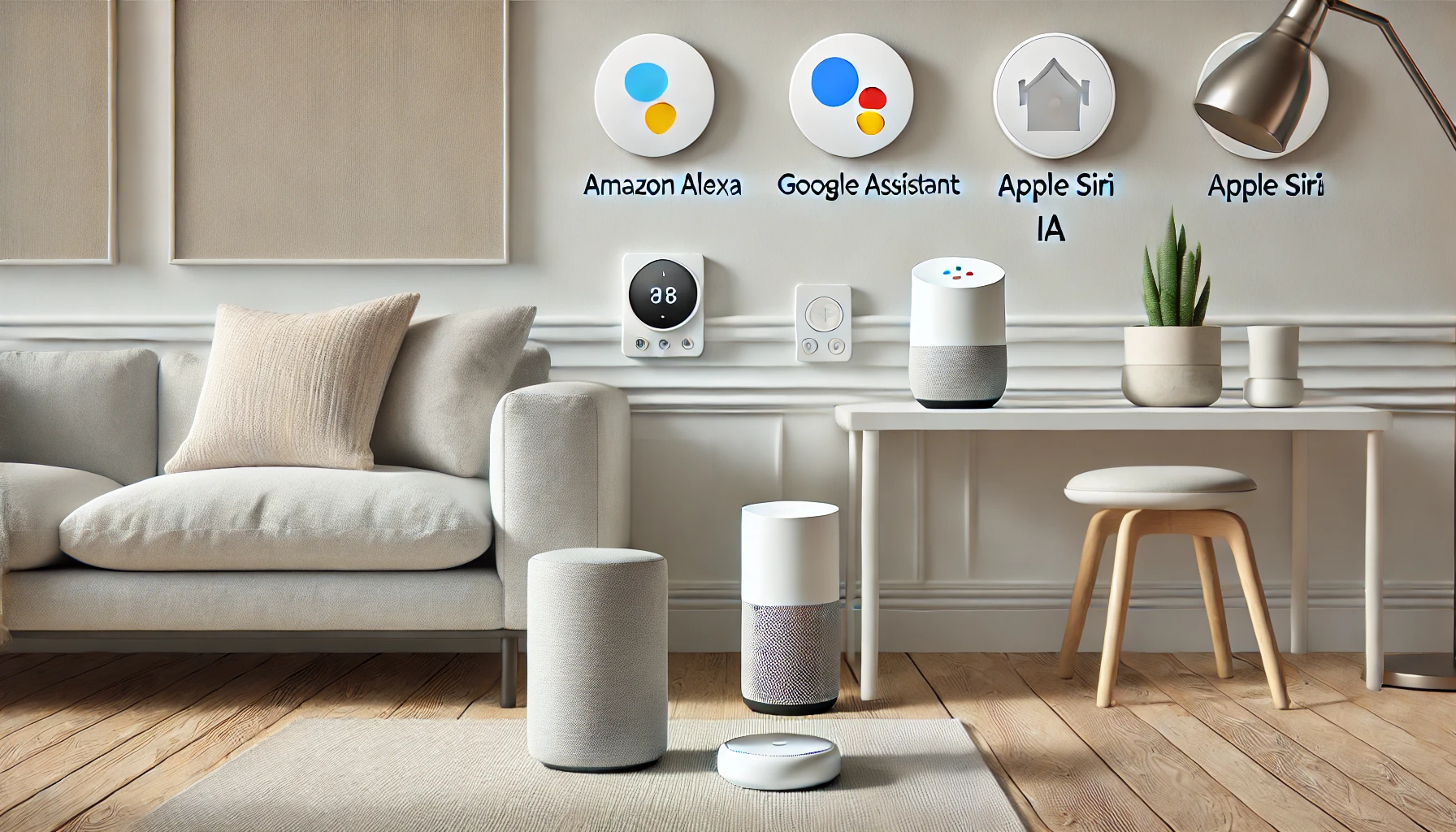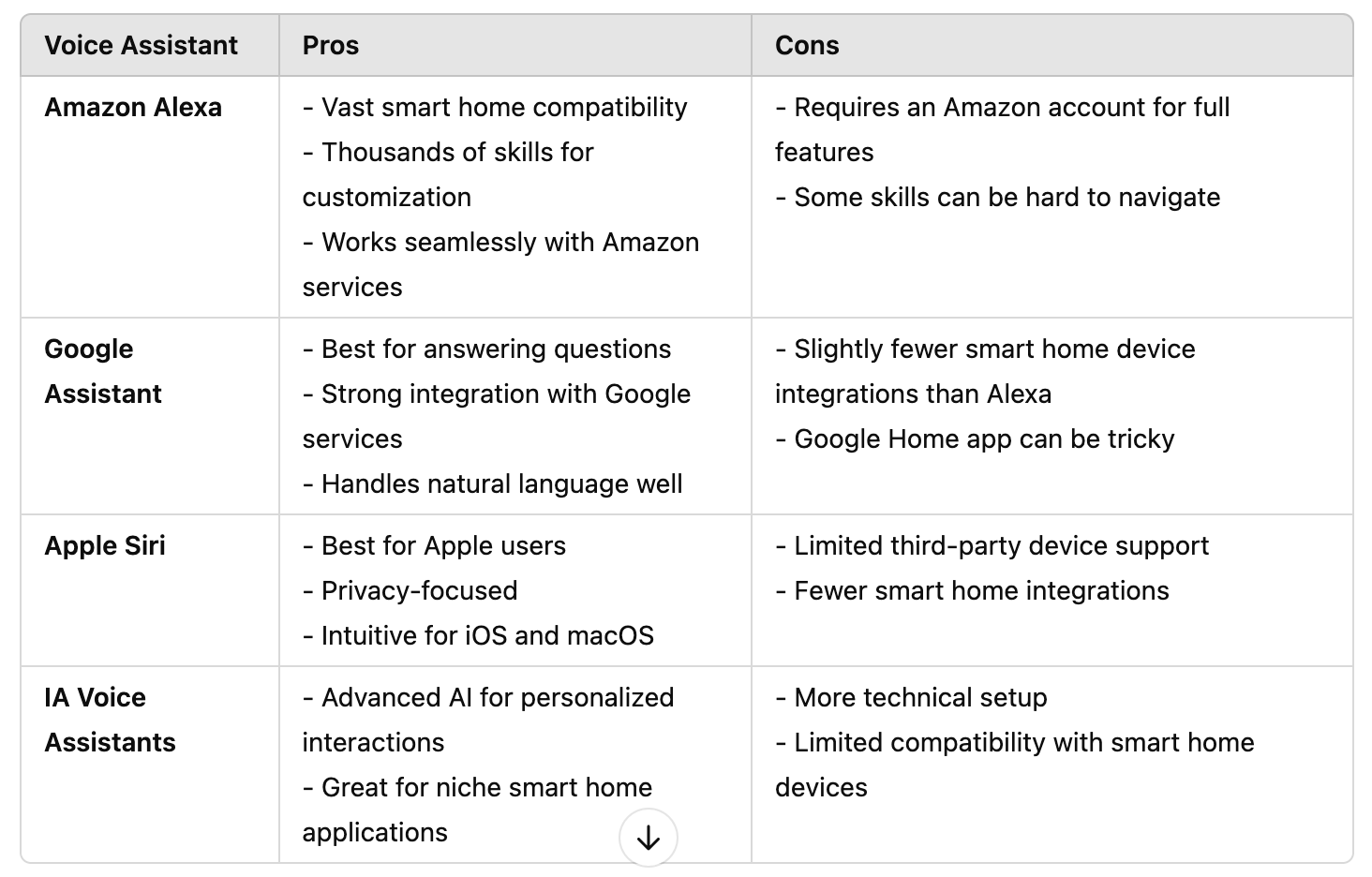Voice assistants are at the core of modern smart homes, streamlining daily tasks through simple voice commands. Whether it's adjusting your thermostat, controlling lights, or checking your calendar, voice assistants are becoming essential to home automation. With several options available—Alexa, Google Assistant, Siri, and even emerging IA (Intelligent Assistant) solutions—it can be difficult to determine which one suits your smart home best. This guide compares the top three most popular voice assistants and provides an overview of IA options, helping you make the right choice.

Alexa, Google Assistant, Siri: Top 3 Voice Assistants
When it comes to voice assistants, Amazon Alexa, Google Assistant, and Apple Siri dominate the market. Each offers distinct features, integrations, and advantages depending on your home setup and personal preferences. Let’s break down how each assistant can enhance your smart home.
1. Amazon Alexa
Amazon’s Alexa has long been a leader in the voice assistant market. Alexa is compatible with a vast range of smart home devices, allowing you to manage lights, security systems, and appliances through simple voice commands. It powers devices such as the Amazon Echo and can be expanded using "skills," which offer specialized functions for music streaming, smart appliances, shopping lists, and more. Alexa is highly customizable, offering seamless integration with numerous smart home products.
Key Features:
- Compatible with over 100,000 smart home devices.
- Extensive skills library for expanded functionality.
- Seamlessly integrates with Amazon services like Prime Music and Audible.
Alexa's ability to work with so many devices makes it an attractive choice for those looking to build an all-encompassing smart home system. Whether you're turning off lights, adjusting your thermostat, or adding items to your shopping list, Alexa provides a comprehensive solution.
2. Google Assistant
Google Assistant is known for its natural language processing and excellent AI capabilities. Integrated with Google services such as Gmail, Google Calendar, and YouTube, this voice assistant stands out for answering questions and performing tasks based on your personal schedule. It powers Google Nest smart speakers and works well with third-party devices. What sets Google Assistant apart is its deep connection with Google Search, providing accurate and helpful responses to general questions.
Key Features:
- Superior voice recognition and natural language understanding.
- Deep integration with Google services.
- Personalized responses for different household members.
For users already invested in the Google ecosystem, Google Assistant provides a seamless experience, making it ideal for tasks like managing your day, setting reminders, or playing YouTube videos. Its smart home capabilities are growing, with more integrations added regularly.
3. Apple Siri
Apple Siri is perfect for those entrenched in the Apple ecosystem. Integrated with Apple HomeKit, Siri offers hands-free control of smart home devices, including lights, cameras, and locks, with just a voice command. Siri’s deep integration with iOS and macOS means it works flawlessly with iPhones, iPads, and Macs, allowing you to manage tasks across all your Apple devices.
Key Features:
- Hands-free control of Apple HomeKit-enabled devices.
- Integrated with iPhone, iPad, and Mac for a seamless experience.
- Strong focus on privacy and data protection.
Siri is an ideal option for users who already use Apple devices, as it leverages Apple’s ecosystem to create a unified, privacy-conscious smart home experience.
The Rise of IA Voice Assistants
In addition to the big three voice assistants, IA (Intelligent Assistant) solutions are starting to emerge as niche players in the smart home market. These assistants are built on advanced AI algorithms designed to adapt to user preferences and commands over time. Unlike Alexa, Google Assistant, or Siri, which have a broad focus, IA voice assistants often excel in specific areas such as home security, energy management, or advanced automation.
Some examples of IA voice assistants include virtual agents powered by technologies like IBM Watson, which offer more personalized interactions. These assistants often integrate with IoT (Internet of Things) devices, allowing deeper automation within your home.
Why Consider IA Voice Assistants?
- Advanced AI algorithms for personalized interactions.
- Adapt to user behavior over time.
- Ideal for smart home power users seeking specialized functionality.
However, IA assistants are still developing and may not offer the same broad compatibility as Alexa, Google Assistant, or Siri. They are often tailored for specific use cases and can require more technical knowledge to set up and operate.
Pros and Cons of Top Voice Assistants

Final Thoughts
Choosing the best voice assistant for your smart home depends largely on your current devices and your preferences for privacy, compatibility, and functionality. Amazon Alexa provides the widest compatibility, making it ideal for users seeking a versatile and customizable smart home experience. Google Assistant excels in natural language processing and Google integration, making it perfect for users who already rely on Google services. Apple Siri offers a seamless experience for those who prefer Apple’s ecosystem, ensuring privacy and ease of use.
For those who want to explore advanced AI solutions, IA voice assistants offer a glimpse into the future of personalized, intelligent home automation. However, these options may require more technical setup and tend to be more niche in their applications.
Ultimately, the right voice assistant for your home will enhance how you interact with your devices and manage daily tasks. Whether you choose Alexa, Google Assistant, Siri, or an IA-powered assistant, each provides unique advantages for smarter living.